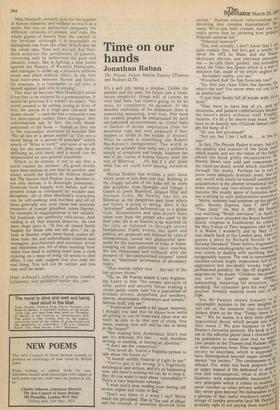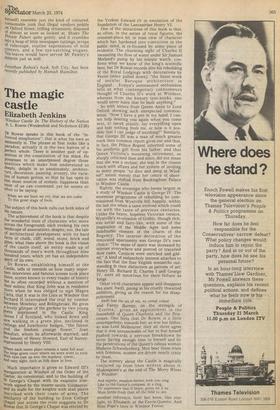Time on our hands
Jonathan Raban
The Private Future Martin Pawley (Thames and Hudson £2.75)
It's a soft job, being a prophet. Unlike the present and the past, the future has a totali tarian simplicity: things will, of course, be very bad then, but there's going to be no mess, no complexity, no paradox. In the dreadful uniformity of the millenium there is something reassuring, even cosy. Nor need the modern prophet be embarrassed by such old-fashioned accoutrements as crystal balls
or flashes of divine inspiration (fine for mountain tops, but very awkward if they happen to strike in the middle of dinner). What he needs is something like Robert MacKenzie's swingometer. The world in which he actually lives turns into a pollster's sample of symptoms and trends. Suppose the rest of the course of human history went the way of Billericay ... Ah, but if it did: think what fun we could have scaring ourselves sick.
Martin Pawley has written a silly book which more or less does just that. Bobbing in the choppy tail-end of the wake left by more able prophets, from Spengler and Ortega y Gasset to Lewis Mumford, Jacques Ellul and Norman Cohn, Mr Pawley has hit on Billericay as the dangerous seed from which our future is going to spring. Here is the "privatised" suburb ballooned-out to a global scale. Dishwashers and spin-dryers have taken over from the people who used to do their jobs; life is an illusion to be watched on the telly or listened to through stereo headphones. Public events, like sport and politics, are produced and directed by cynical entrepreneurs, turned into gladiatorial spectacles for the entertainment of folks at home, lounging on their adjustable vinyl couches. We are threatened and titillated with the prospect of "de-communitised citizens" tuned into an "electronic incarnation of secondary reality."
"That sounds rather nice ... the last of the last picture shows."
"Oh, no, Mr Pawley makes it very frightening. Listen to this: "the uneasy spectacle of army, police and security forces making a vacant public realm 'safe' for a population of drunken drivers, shoplifters, pot smokers, thieves, abortionists, fornicators and looters." Serious stuff, you see." " 'Fornicatorsr sounds a bit passe. Anyway, I thought you said that he shows how we're all getting so cut off from each other that we won't be able to do that sort of thing. You mean, making love will still be the in thing in the future?"
"Not making love, fornication. Don't you see, it's different. It's like ... well, drunken driving, or stealing, or having an abortion."
"I don't see the connection." "You never do. You're a hopeless person to talk about the future to."
"It sounds terribly Festival of Light to me." "You've got it all wrong. It's frightfully sociological and serious, and it's all happening now, and there's nothing we can do to stop it. Hey, do you want to hear about 'ostensibility'? That's a very important concept." "I wish you'd stop reading your boring old review copies and come to bed." "Don't you listen to a word I say? We're much too privatised. This is,"the end of effort and the triumph of sensation divorced from
STpeheetator March 23, 1974i, action." Human sexual relationships arej devolving into complex masturbatory fall] tasies. We're just inert voyeurs. And you call really prove that by showing how popular! Polaroid cameras are."
"Polaroid cameras?"
"Yes, well actually, I don't know that I call quite explain that, but he's got a terrific b1t! about the 1972 Le Mans, and the Nix0,11:1 McGovern election, and television personal,' ties — he calls them 'goalies,' and something, about the Vibro Sea Spoon which is a sort ei imitation fish, made of tin which anglers use ... Secondary reality, you see." "Privatised fish! Do fish fornicate too?"
"No, they just chase Vibro Sea Spoons. to' what's the use? You never were cut out to be an intellectual."
"I just hate books full of words with Z'S iSI them." "They have to have lots of z's, and ab; stractions, and passive constructions becaus` the future's pretty technical stuff. Fran1(1),`,' Annette, it's all a bit above your head. Y0LIA''' have to be heavily into 0-Levels before you'" get the hang of it."
"Do you feel privatised?"
"Not tl tot yet, but I bet I will do ... in the f tur ' In fact, The Private Future is scary, but it the quality and manner of the book itselr which scares, and not the vision of the future which the book glibly encapsulates. Pawley blows very cold and censorious 011 the hand-me-down world which reaches us through 'the media.' Perhaps he is prove some obliquely dramatic point, but the only world with which he himself exhibits all acquaintance is the phoney sensational one4 news stories and two-minute in-depth 1,15 features. His muddy spoor of footnotes sews one scuttling to such authoritative sources s "'Metric numbers lead postmen up the garal path,' Sunday Express, June 7, 1970" 8,IV "Time (ibid)." On May 4, 1972, Mr Pawl!' was watching "Welsh television"; in April, nef appears to have attended the Royal Society ° Health congress in Eastbourne; he refers ta,, the May 8 issue of Time magazine (did he 1)031 it in Wales, I wonder?); and by May 11 111
,,
was clearly back in the London area, since IT quotes a piece by Richard Neville in thfl Evening Standard. These furtive fragments °e unconscious autobiography are the nearest 1!5 ever comes to dealing with anything that y,I„ recognisably human. The rest is remorselesse machine-turned: bright, impersonal, full 0f t1 aggressive but decidedly wonky logic °A professional punditry. He rips off slogans an"t epigrams by the dozen. "Children: the produc.„ you love to hate" quips one chaptelt subheading, simpering for attention; "P°51 smoking: the consumer gets his way'' sqd another, breezily making news out of ° rope. Yet Mr Pawley shows himself to ilee remarkably immune to his own insights. as will tell us, for instance, that society 11,,,e broken down so far that "Today there is 'we.' " We, he insists, is a dirty little piece evii hypocritical deceit which people use W11,,Ar they mean I. We also happens to be Pawley's favourite pronoun. His book is ten in the editorial plural (and I checked his publishers to make sure that he Was."e, nine people in the Thames and Hudson off;che or three reporters from Time magazine). to society he describes, which is supposed 0 have disintegrated beyond repair alreadY,ic, always "our society." The carelessness is Ile nificant. For, while this book purports t° ,st an angry expose of life dedicated to aeclu'to tion and consumption, what it does ls,.he illustrate, with reprehensible innocence, ii very principles which it claims to ana1Ys,e;e15 never touches on what privacy actuallY like, never goes beyond the dishwasher to 10 a glimpse of that useful machine's owner', is strings of tawdry proverbs (and Mr PaWl.,e.Yej probably right in not paying them much n` himself) resemble just the kind of coloured, Consumable junk that illegal vendors peddle on Oxford Street; trifling ornaments, disposed of almost as soon as looked at. Shake The Nate Future quite gently, and it crumbles into a heap of little newspaper cuttings, scraps of videotape, routine expressions of mild concern, and a few eye-catching slogans. Tea-leaves would have served Mr Pawley's Purpose just as well.
Jonathan Rabares book, Soft City, has been recently published by Hamish Hamilton.



































 Previous page
Previous page